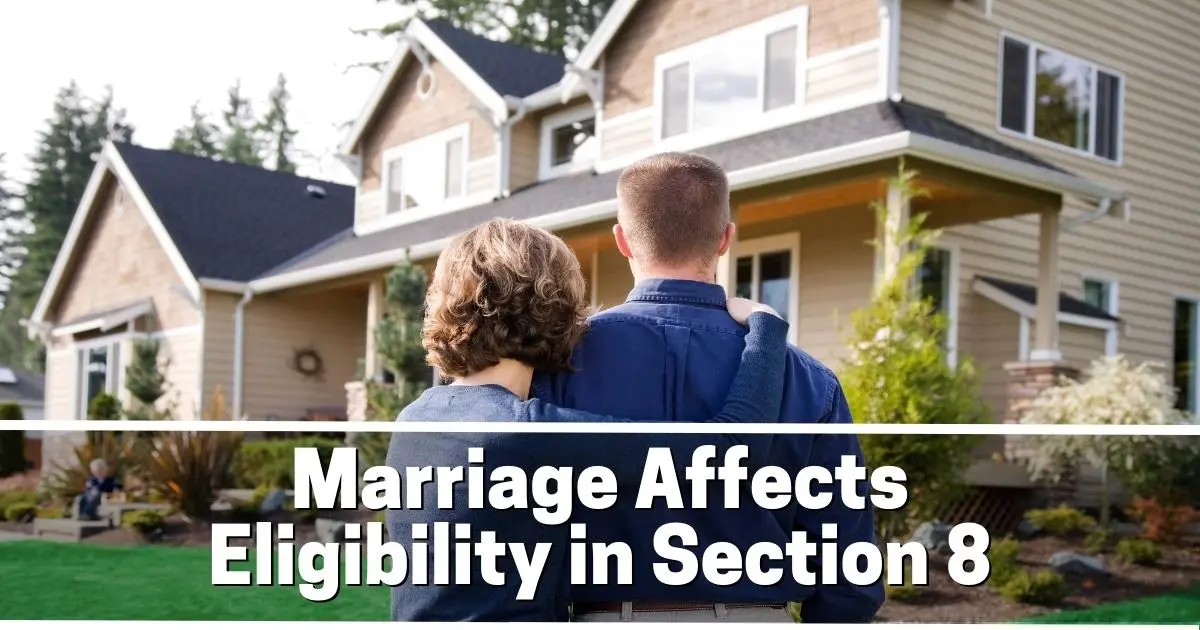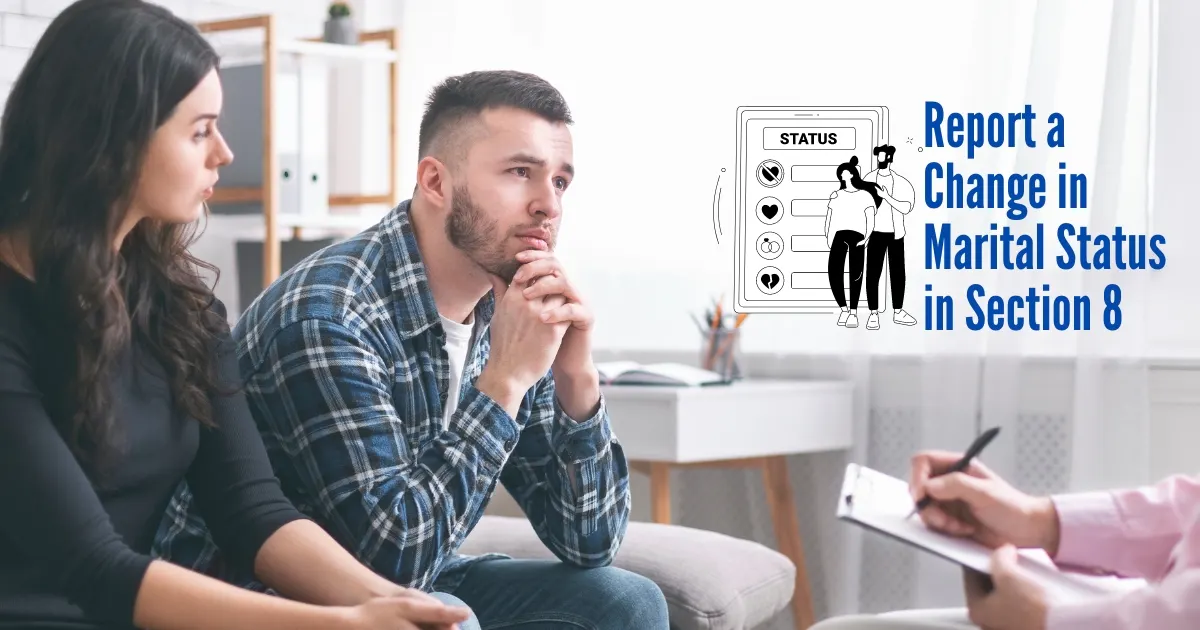What Happens When You Get Married While Living in Section 8?
Living in section 8 housing can be a great opportunity to benefit from affordable housing and other services at a discounted rate based on your income. However, when you are living in section 8 housing and you get married, it is important to be aware of the impact your new spouse’s income will have on your eligibility and housing subsidy.
When you are living in section 8 housing and you get married, your household income will be combined with your spouse’s income for the purposes of determining your eligibility for the program and the amount of your housing subsidy. This means that your combined income will be used to determine whether you are still eligible for section 8 and, if so, whether your housing subsidy should be increased or decreased.

If your combined income is higher than the income limit for the area in which you are living, you may no longer be eligible for section 8 housing. If your combined income is lower than the income limit, your housing subsidy may be reduced, depending on your specific circumstances.
It is important to inform your local housing authority and your case worker of the change in your marital status and the corresponding change in income as soon as possible. This is important because if you fail to do so, there can be a penalty for fraudulent representation.
You should be aware that your combined income will be used to calculate your rent. The amount of your rent will be based on your total household income minus any applicable deductions. It is important to understand that if your rent is too high, it may put you at risk of having to leave your section 8 housing.
Finally, you should also be aware that if you have any additional sources of income, such as Social Security, these will also be taken into consideration when determining your eligibility and housing subsidy.
It is important to be aware of the potential changes to your section 8 housing eligibility and housing subsidy due to your marriage and to inform your local housing authority and case worker of any changes in your income or marital status as soon as possible. Understanding how your combined income may affect your eligibility and housing subsidy can help you make the most of your section 8 housing and ensure that you are able to remain in your home.
Recommended to Read: Who Can Live With You on Section 8
How Marriage Affects Eligibility in Section 8?
Marriage can affect eligibility for the section 8 housing program in a few different ways. The section 8 program, also known as the Housing Choice Voucher Program, provides vouchers to low-income families to help them afford safe and decent housing in the private market. These are the after marriage points which can affect the eligibility in section 8.

Income of a Married Couple:
When it comes to income, section 8 eligibility is based on the combined income of a married couple. If the amount exceeds the program’s income limits, the couple may not be eligible for assistance. However, it’s important to note that individuals are also subject to income limits when it comes to the amount of rent they’ll be required to pay. So even if their combined income makes them ineligible, they may still be eligible for the program if their individual income meets the criteria.
Size of the Voucher:
When it comes to the size of the voucher, marriage can also have an effect. When households marry, they become larger, which means that the voucher may not be enough to cover all of the rent. For example, a two-bedroom voucher may not be enough for a married couple with children.
Related Post: Add Someone To Your Section 8 Voucher
Citizenship Status:
Marriage can also affect eligibility for the program based on citizenship status. If one spouse is a U.S. citizen and the other is not, the non-citizen spouse may not be eligible for the program. This is because the U.S. The Department of Housing and Urban Development (HUD) requires that all members of a household receiving section 8 assistance must be either U.S. citizens or permanent residents.
The good news is that non-citizen spouses may be able to become eligible for the program. If they are legal residents and have a valid green card, they may be eligible to receive section 8 assistance. For instance, if the non-citizen spouse has been in the U.S. for at least five years and has been granted permanent residency, they may be able to receive section 8 assistance.
If the non-citizen spouse is married to a U.S. citizen, they may be eligible for a green card through that marriage. This process is known as “adjustment of status” and can be done through the U.S. Citizenship and Immigration Services (USCIS). Once the non-citizen spouse has been granted permanent residency, they may be eligible for section 8 assistance.
It’s important to note that even if the non-citizen spouse is eligible for section 8 assistance, the benefits may still be affected. The U.S. government has different rules for non-citizens when it comes to housing assistance. It’s important to research the specific rules and regulations for the section 8 program before applying.
How Marriage Can Affect Your Benefits in Section 8?
Marriage is a life-changing event that can have a significant impact on your finances, including your eligibility for section 8 housing benefits. If you’re receiving section 8 benefits and you’re considering getting married, it’s important to understand how marriage can affect your benefits.
- For one, the addition of a spouse’s income to your household income may make you ineligible for section 8 benefits. Generally, households that make too much money, including combined incomes, may not qualify for the program. Therefore, if you and your spouse’s combined income exceeds the maximum income threshold set by the section 8 program, you may no longer be eligible for benefits.
- This is another way marriage can affect the section 8 benefits is in the calculation of rent that a person must pay. When determining the amount of rent, the section 8 program takes into account the household income and the fair market rent for the area. If a person marries and the income of their spouse is added to their income, the rent may increase, making it difficult for the family to afford the housing.
- If a family is already participating in the section 8 program and they get married, they may also lose their benefits if the new spouse has income or assets that make them ineligible for the program.
Ultimately, marriage can affect section 8 benefits, so it’s important to be informed of the potential implications before taking the plunge, before doing any step must know the disqualify facts of section 8. By understanding how marriage can affect your section 8 benefits, you can ensure that your transition into married life is as smooth as possible.
How Does Marriage Affect Your Rent and Utilities in Section 8 Program?
When it comes to the section 8 program, marriage can have a significant impact on your rent. This is because the program takes into consideration the size of your family for the purpose of calculating your rent. The larger the family, the lower your rent will be.
Marriage doesn’t just affect your rent, however; it’ll also affect your utility allowance. A utility allowance is an estimate of what a household should reasonably spend on utilities, such as water, electricity, and gas. Although the amount of utilities a household is allowed to use each month may be different, depending on the size of the household and the location, the utility allowance is calculated as part of the rent calculation.
When you are married and living with your spouse, the utility allowance for your household will be based on the combined income of both spouses. This means that if both spouses are employed and have the same amount of income, the utility allowance will be higher than if only one spouse was employed. On the other hand, if one spouse is unemployed or has a much lower income, the utility allowance may be lower.
Finally, the utility allowance may also be affected by the type of residence you live in. For example, if you live in a single-family home, the utility allowance may be higher than if you live in an apartment or a mobile home.
How to Report a Change in Marital Status in Section 8?
If you have recently changed your marital status, it’s important to notify the housing authority that administers your section 8 voucher. This change will affect your eligibility and the amount of assistance you’re eligible for, so it’s important to report it in a timely manner. Follow these steps to report a change in marital status in section 8.

How to Notify the Section 8 Office:
The first step is to contact the housing authority that manages your section 8 voucher. You can usually do this by phone or in person. Inform them of your change in marital status, and provide them with any relevant documents such as a marriage certificate or divorce decree.
Update Your Household Information:
The housing authority will need to update your household information to reflect the change in marital status. You will need to provide them with updated income and assets information for both you and your spouse, as well as the number of people living in the household.
Submit a Recertification Application:
The housing authority will likely require you to submit a recertification application to update your income and assets information. This application will need to be completed and returned to the housing authority within a certain time frame.
It’s important to submit your recertification application as soon as possible, as failure to do so can lead to you losing your section 8 voucher. Make sure you keep a copy of all documents submitted to the housing authority in case you need to refer to them in the future.
Wait for the Housing Authority’s Decision:
After the housing authority receives a recertification application from you and updates your household information, they will determine your eligibility for section 8 housing assistance. You will receive written notice of their decision, and if you are found to be eligible, your voucher will be adjusted accordingly. You can check your section 8 housing waiting list status by websites.
By following these steps, you can easily report a change in marital status in section 8. Make sure to keep the housing authority updated with any changes in your household information, as this can affect your eligibility for section 8 assistance.
Notice:
It is important to note that if you do not report a change in marital status, it can be considered as fraud and could lead to termination of your section 8 benefits. So it’s important to report any changes in marital status as soon as possible to ensure that your section 8 benefits are not interrupted.
Conclusion
Marriage can have a big impact on eligibility for section 8 housing assistance. It’s important to understand how income and the size of the household affect eligibility so that you can take full advantage of the benefits available to you.